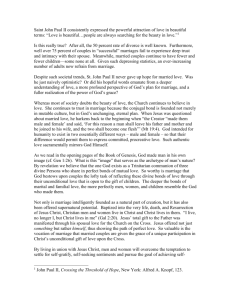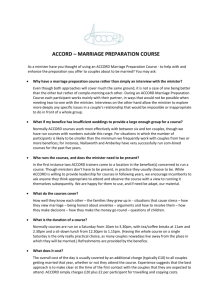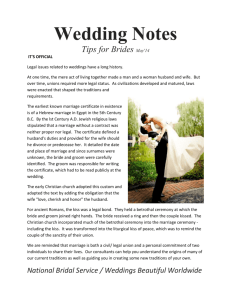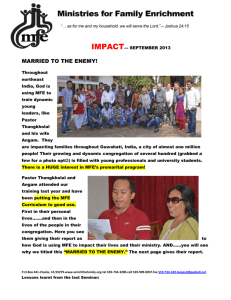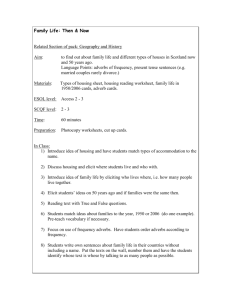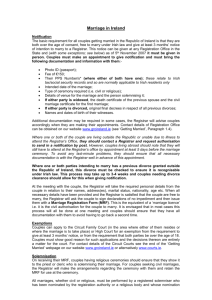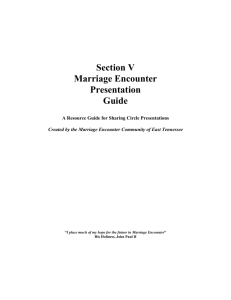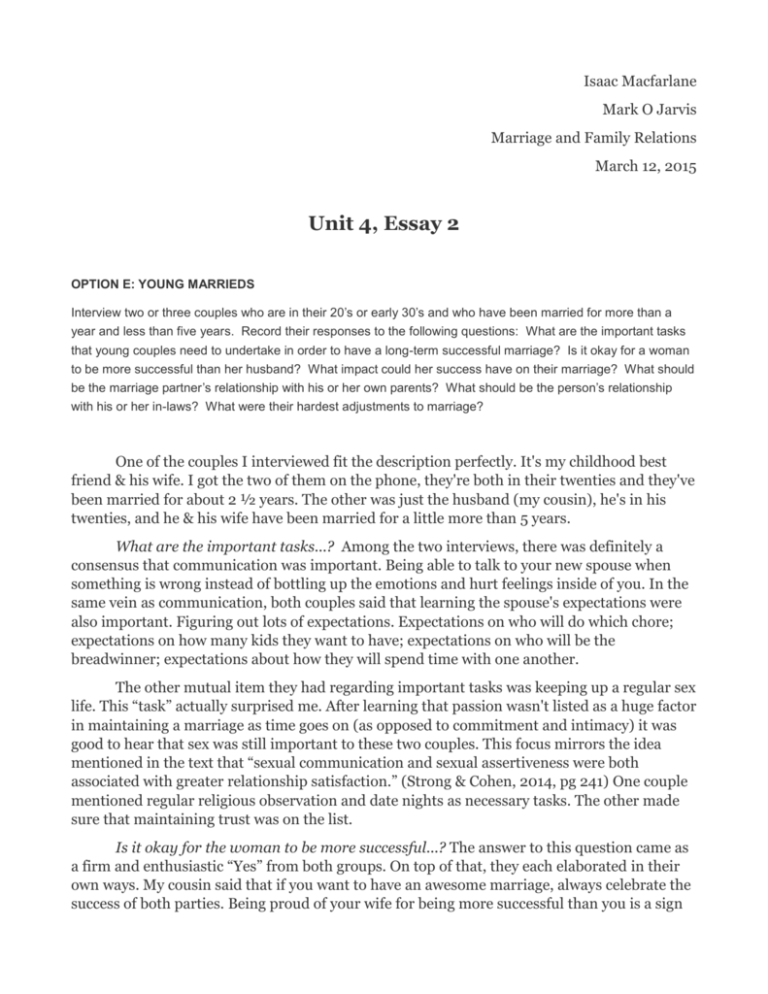
Isaac Macfarlane
Mark O Jarvis
Marriage and Family Relations
March 12, 2015
Unit 4, Essay 2
OPTION E: YOUNG MARRIEDS
Interview two or three couples who are in their 20’s or early 30’s and who have been married for more than a
year and less than five years. Record their responses to the following questions: What are the important tasks
that young couples need to undertake in order to have a long-term successful marriage? Is it okay for a woman
to be more successful than her husband? What impact could her success have on their marriage? What should
be the marriage partner’s relationship with his or her own parents? What should be the person’s relationship
with his or her in-laws? What were their hardest adjustments to marriage?
One of the couples I interviewed fit the description perfectly. It's my childhood best
friend & his wife. I got the two of them on the phone, they're both in their twenties and they've
been married for about 2 ½ years. The other was just the husband (my cousin), he's in his
twenties, and he & his wife have been married for a little more than 5 years.
What are the important tasks...? Among the two interviews, there was definitely a
consensus that communication was important. Being able to talk to your new spouse when
something is wrong instead of bottling up the emotions and hurt feelings inside of you. In the
same vein as communication, both couples said that learning the spouse's expectations were
also important. Figuring out lots of expectations. Expectations on who will do which chore;
expectations on how many kids they want to have; expectations on who will be the
breadwinner; expectations about how they will spend time with one another.
The other mutual item they had regarding important tasks was keeping up a regular sex
life. This “task” actually surprised me. After learning that passion wasn't listed as a huge factor
in maintaining a marriage as time goes on (as opposed to commitment and intimacy) it was
good to hear that sex was still important to these two couples. This focus mirrors the idea
mentioned in the text that “sexual communication and sexual assertiveness were both
associated with greater relationship satisfaction.” (Strong & Cohen, 2014, pg 241) One couple
mentioned regular religious observation and date nights as necessary tasks. The other made
sure that maintaining trust was on the list.
Is it okay for the woman to be more successful...? The answer to this question came as
a firm and enthusiastic “Yes” from both groups. On top of that, they each elaborated in their
own ways. My cousin said that if you want to have an awesome marriage, always celebrate the
success of both parties. Being proud of your wife for being more successful than you is a sign
you truly love her. My best friend and his wife explained that “success” is in the eye of the
beholder, and that eventually, the goal should be to view things not as success for the
individual, but success for the family.
What impact could the wife's success have...? In my best friend's marriage, his wife is
actually the breadwinner at the moment. He said that it means he's had to figure out how to
take care of the house. His wife said that she has to set clear expectations about what she
wants done around the house while she's gone. My cousin, on the other hand, is the
breadwinner. He said that he would have to work part time or maybe be a stay-at-home dad.
In both cases, the couples seemed to think that the wife's success wouldn't have a negative
impact on their marriage.
What is the relationship with parents and in-laws...? I combined these two questions
because, with both couples, they had roughly the same answers to the questions. My cousin
said it quite succinctly, “The relationship with parents/in-laws should be one of respect, but
not control.” Both couples acknowledged that the importance of relationship with the spouse
should supersede that of the relationship with one's parents or in-laws. Ideally, in my friend's
mind, the line between in-laws and parents should eventually blur to simply that of “family.”
My friend's wife mentioned that being close to your parents, especially the one of the same
gender, is useful because there are things that they can identify with better than your spouse
can, no matter how close your are to your spouse.
What was the biggest adjustment...? The answers given by both couples can be
summed up into approximately one statement: Learning to meld two individual lives into one
cohesive, married life.
Works Cited
Strong, B, & Cohen, T. F. (2014). The marriage and family experience: Intimate relationships in a changing
society (12th ed.). Belmont, CA: Wadsworth.



